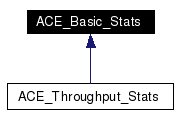
#include <Basic_Stats.h>
Inheritance diagram for ACE_Basic_Stats:

Public Member Functions | |
| ACE_Basic_Stats (void) | |
| Constructor. | |
| ACE_UINT32 | samples_count (void) const |
| The number of samples received so far. | |
| void | sample (ACE_UINT64 value) |
| Record one sample. | |
| void | accumulate (const ACE_Basic_Stats &rhs) |
| Update the values to reflect the stats in rhs. | |
| void | dump_results (const ACE_TCHAR *msg, ACE_UINT32 scale_factor) const |
| Dump all the samples. | |
Public Attributes | |
| ACE_UINT32 | samples_count_ |
| The number of samples. | |
| ACE_UINT64 | min_ |
| The minimum value. | |
| ACE_UINT32 | min_at_ |
| The number of the sample that had the minimum value. | |
| ACE_UINT64 | max_ |
| The maximum value. | |
| ACE_UINT32 | max_at_ |
| The number of the sample that had the maximum value. | |
| ACE_UINT64 | sum_ |
| The sum of all the values. | |
Compute the average and standard deviation (aka jitter) for an arbitrary number of samples, using constant space. Normally used for latency statistics.
|
|
Constructor. The number of samples is pre-allocated, and cannot changes once the class is initialized. |
|
|
Update the values to reflect the stats in rhs.
|
|
||||||||||||
|
Dump all the samples. Prints out the results, using msg as a prefix for each message and scaling all the numbers by scale_factor. The latter is useful because high resolution timer samples are acquired in clock ticks, but often presented in microseconds. |
|
|
Record one sample.
|
|
|
The number of samples received so far.
|
|
|
The maximum value.
|
|
|
The number of the sample that had the maximum value.
|
|
|
The minimum value.
|
|
|
The number of the sample that had the minimum value.
|
|
|
The number of samples.
|
|
|
The sum of all the values.
|
 1.3.9.1
1.3.9.1